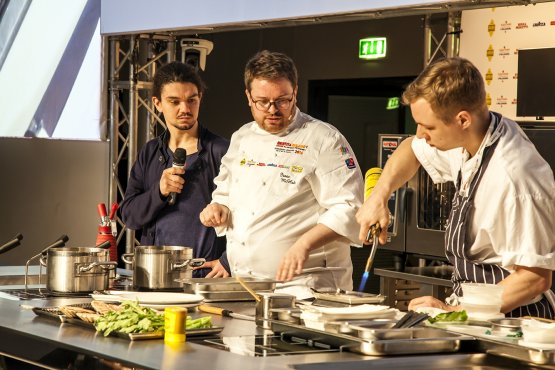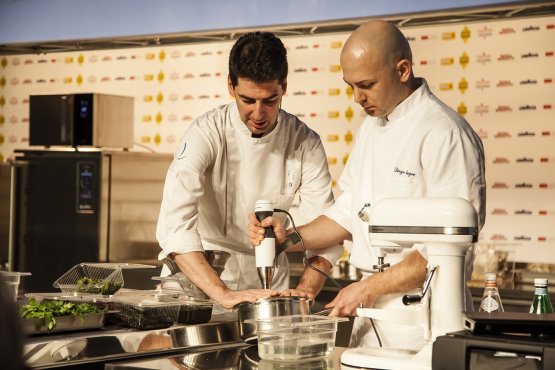Passion, pride, fear. And the explosive strength of freedom. «This is not a political congress», Paolo Marchi immediately points out, opening the works at Identità Milano, twelfth edition. Yet cooking interacts with the world, it is (or: creates) culture and society, it lives in its time, with all its difficulties. «We’re proud to have chosen The Strength of Freedom as this year’s theme. We were a bit scared, after the success of Identità Expo», Claudio Ceroni, patron of the same MagentaBureau organising the event, said by way of introduction. The fear is overcome as the room fills up as usual, more than usual.
«I take the freedom not to cook», starts off the first speaker, Davide Scabin. We could perhaps accuse him of his lesson being very outside the box, but it was coherent. Cooking interacts with the world. While Identità chose a serious theme, the chef from RIvoli keeps the standard high by speaking not of mirepoix or vacuum cooking but of history and humanity. He starts from afar, from the Anthropocene, «the era when man first appeared». It’s almost a detail in the history of the planet, 3 minutes if Earth had lived 24 hours, «yet it’s been enough for us to destroy it. And more than anyone else’s, it’s my mother’s fault, that of the Post War generation».

The lesson by Isaac McHale
enjoying the role of a guru-Cassandra, «in 2007 when I arrived at Identità, molecular cuisine prevailed, I presented a salad and an aubergine with tomato. I returned in 2011, and everyone was making salads, I took a syphon out of the drawer, now forgotten. Today the chef’s vegetable garden and fermentations prevail». And he tries to move ahead once again, as histrionic as ever. Three messages. The first: «Fine dining cannot stand on its feet, restaurants go bankrupt, you can’t say no to the support of large firms, which are the only one with which you can interact if you really want to change things, so I thank them». The second: «Everyone speaks of organic, but no one says how there are often no tools to truly understand what it contains, as a paradox, GMO products are much more transparent» (a short while later
Lucio Cavazzoni, patron of
Alce Nero replies to him: «Some work well, some don’t. Not telling these apart is a mistake»). The third: «If we don’t want to face disaster, we need to eat meat once a week, no more. Otherwise, beans lentils, chickpeas... legumes!».
The freedom of presenting new restaurant formats. Isaac McHale tells us about his recipes made with Cornish fish or Scottish scallops (the “Japanese style” mackerel was excellent, its fat removed with vinegar and then paired with chrysanthemum – not the flower but the leaves and stalks). But what strikes is his choice, the first in the UK, where he works, to introduce the Alinea-format: you go to the restaurant like you go to the theatre, that is to say after buying the ticket in advance, «I seat 40-50 guests, if every night some ten of them don’t show up, it’s a problem». The solution is this sort of pre-sale, which has been used by Alinea in the US and has now been implemented by Heston Blumenthal at the The Fat Duck too: «He called me to thank me. “A beautiful idea, but I couldn’t open the way. Now you’ve paved it and have been criticised, I’ll follow”, he joked» but not that much.
The freedom of playing with colours, with nature’s «shapes, flavours».
Enrico Crippa is the usual elf immersed in good and colourful vegetables, which allow him to create a lesson that is playful (in the presentation), elegant (in the shapes) and harmonious (on the palate). His lesson is on colours: green and yellow from a bass carpaccio with lime, lemongrass and green pepper vinaigrette, lime gelatine, red shiso, wild sorrel and so on, plus iceplant juice. The white («It’s pureness, elegance ») from
La Serra, «a late winter dish, my homage to this season»: celeriac and turnip, in different textures, marinated, and as broth, gelatine, cream. The pink is a magnificent risotto aromatised with shiso and raspberries. The orange-yellow is cod with a pumpkin sauce. The purple from the prawn cocktail with radicchio from Treviso, the dish for 2016 in our special report on the new signature recipes. The black is fake burnt leek and caramelised onions with stale bread.

The lesson by Massimiliano Alajmo
The freedom of thinking and innovating. “We are what we are” is the title of the lesson featuring
Massimiliano Alajmo and
Mauro Defendente Febbrari. The latter is an endocrinologist and goes to the source of flavours, revealing what science can now tell us: «We know what flavours come from. We know the cells in the intestine have a fundamental role in deciphering them, even better than the brain, so much so it can be considered a “second brain” and in this case with an even bigger function». We are what we are and what we have become thanks to the experiences we’ve had since birth: «We cook like with two ingredients, roots and wings».
Alajmo doubles up with
Defendente in this search for the first origin of flavours, after all he’s been long investigating on water and fluids. And his presentation, structured in three recipes (a vegetal one, with
Beans and banana. A fish one, with fried mackerel bones fried in a very thin batter. A dessert,
Almond mozzarella, the dish for 2016 in our special), also implies praising pressure-cooking, «which was once hardly popular in fine dining». Yet it can give extraordinary outcomes: «A piglet cooked in a pressure oven, under controlled temperature, is much more succulent than one cooked at low temperature. And after searing it it’s even crispier». Water, vapour are the good vessel for natural flavours.